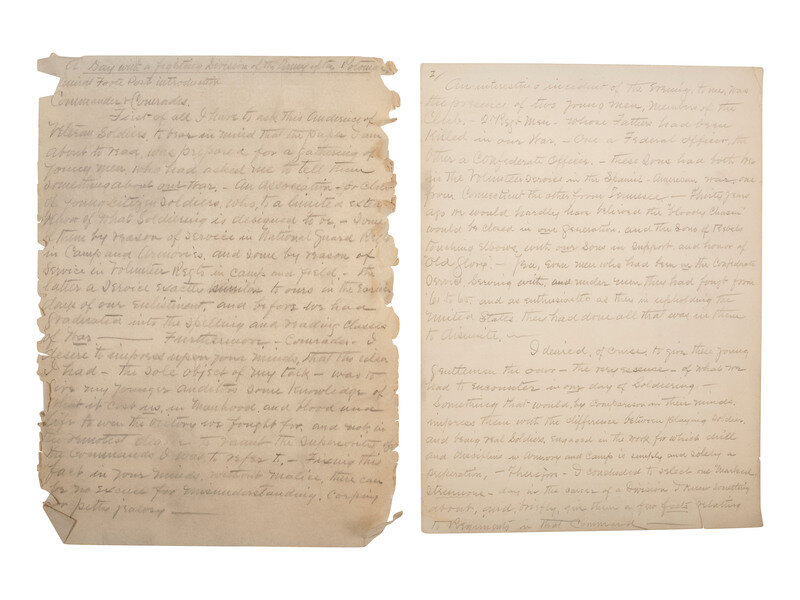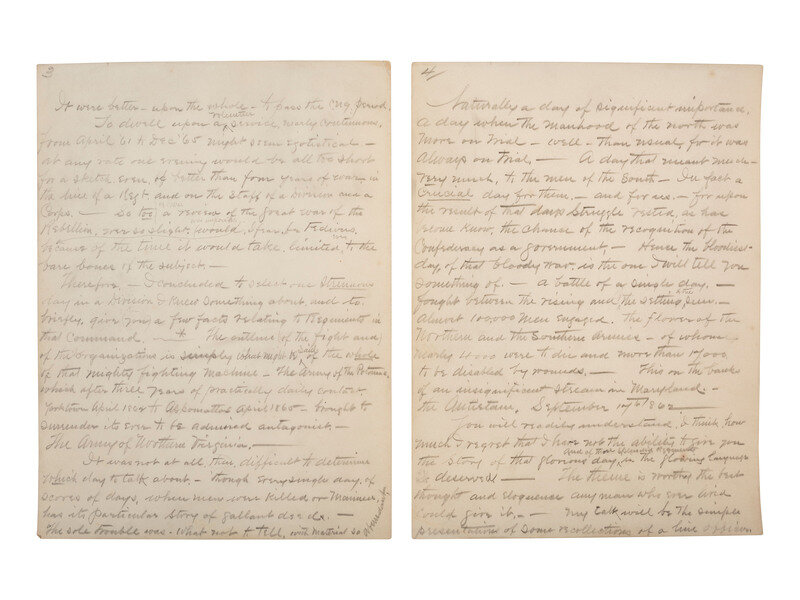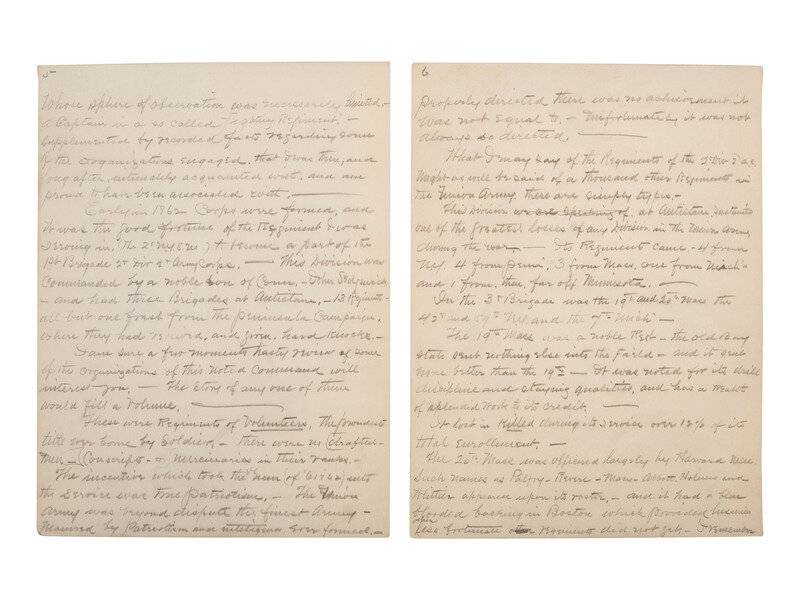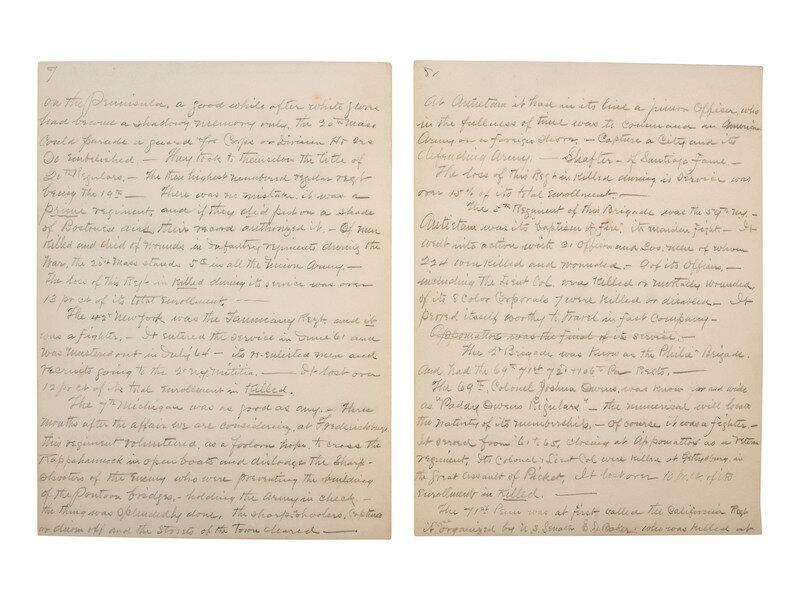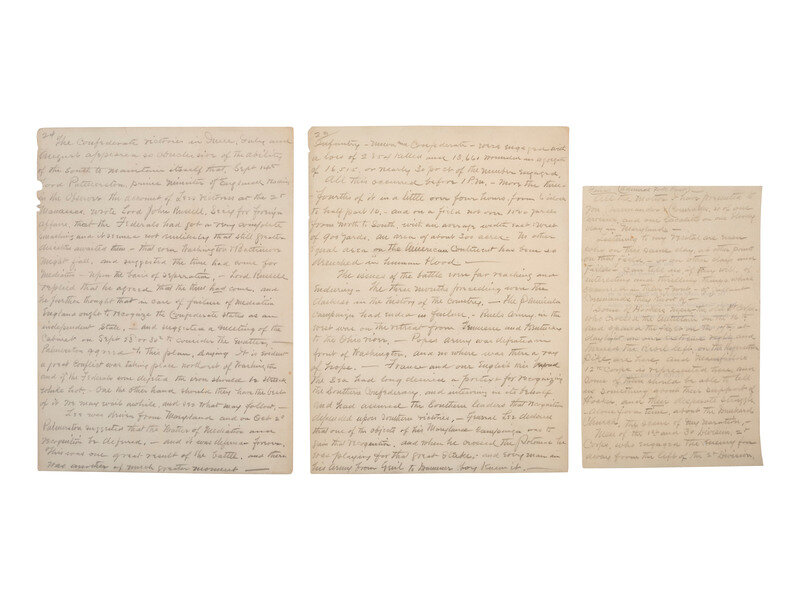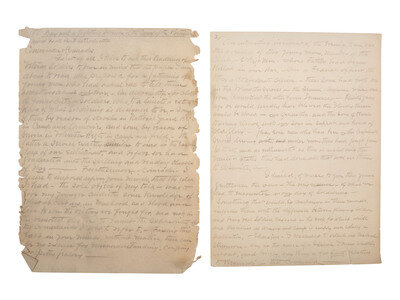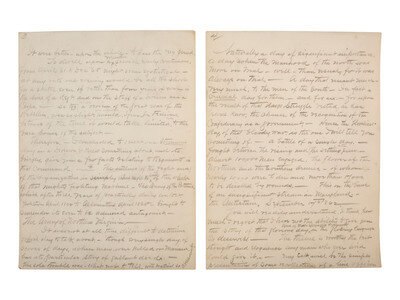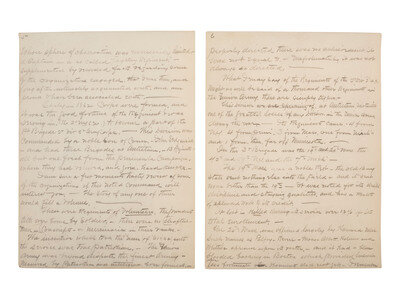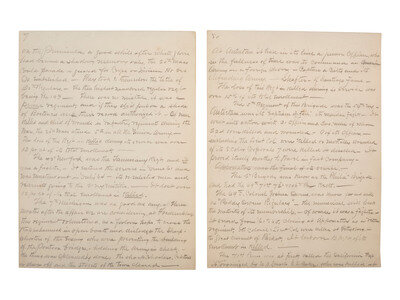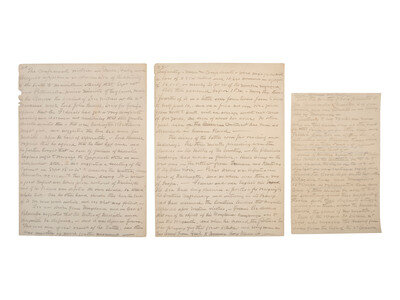Lot 453
[CIVIL WAR]. 24pp speech written post-war by 2nd NY State Militia veteran, regarding Antietam.
Sale 1345 - American Historical Ephemera and Photography Online
Lots Open
Jun 19, 2024
Lots Close
Jul 2, 2024
Timed Online / Cincinnati
Own a similar item?
Estimate
$400 -
600
Price Realized
$254
Sold prices are inclusive of Buyer’s Premium
Lot Description
[CIVIL WAR]. 24pp speech written post-war by 2nd NY State Militia veteran, regarding Antietam.
Manuscript speech from a member of the 82nd New York Infantry Regiment (2nd New York State Militia), which became part of the 1st Brigade, 2nd Division, II Army Corps in March 1862. 24pp., approx. 8 1/2 x 11 in. (19th page missing; heavy chipping to first page, some pencil smearing and toning/brittleness to edges throughout).
The speechmaker begins by explaining that the paper he is prepared to read was written as an answer to "young men who had asked me to tell them something about our war." Thus, he writes, "the sole object of my talk - was to give my younger auditors some knowledge of what it cost us in manhood and blood and life to win the victory we fought for..."
He recalls how in the audience of young men for whom he originally wrote the speech, there were two men whose fathers had been killed on opposite sides of the Civil War. The young men had both served in the volunteer service during the Spanish American War. The writer remarks on how no one might have believed the chasm of the Civil War could be closed in one generation, or that former Confederate soldiers, and their descendants, would fight alongside and under men they had opposed from 1861 to 1865.
The topic of the speech, then, is identified as "one strenuous day in a Division I knew something about," during the great opposition between the Army of the Potomac and the Army of Northern Virginia. He writes: "The bloodiest day, of that bloody war is the one I will tell you something of. A battle of a single day. Fought between the rising and the setting sun. Almost 100,000 men engaged. The flower of the Northern and Southern armies - of whom nearly 4000 were to die and more than 17000 to be disabled by wounds. This on the banks of an insignificant stream in Maryland, the Antietam. September 17th 1862."
His regiment (82nd NY; 2nd NYSM) became part of the 1st Brigade 2nd Division II Army Corps. Commanded by John Sedgwick. They were known as the Philadelphia Brigade. He gives into details about each regiment in the brigade, referring to its reputation, his own recollections, vignettes from prior service record, and even statistics related to casualties at Antietam. Page 16 begins the battle story. His command slept on the eastern bank of the Antietam on the night of the 16th, and left its bivouac and crossed the stream on the morning of the 17th. They got to the western side of the stream, formed under cover of the sash woods in three lines of brigades. 34th NY got separated and engaged near Dunker Church.
It appears that a good portion of the action of the battle would have been included on page 19, which is missing here.
Page 20 begins with a description of actions winding down, including a mention of the 15th Massachusetts (who suffered one in every eight men killed) bringing off a Confederate battle flag, wrestled from its bearer in hand-to-hand combat.
He writes: "Although the fatal field is now swept by crossing fires, some regiments march off in perfect order."
Emphasizing the brutality and the sheer bloodiness of the battle for its duration and area, he describes the battlefield: "a field not over 1500 yards from north to south, with an average width east to west of 900 yards, an area of about 300 acres. No other equal area on the American continent has been so drenched in human blood."
Toward the end of the speech, the writer brings home the wider significance of the battle in the context of the war and the world stage: "The issues of the battle were far reaching and enduring - The three months preceding were the darkest in the history of the country...France and our English kin beyond the sea had long desired a pretext for recognizing the Southern Confederacy, and intervening in its behalf and had assured the Southern leaders that recognition depended upon southern victories. General Lee d[?] that one of the objects of his Maryland Campaign was to gain that recognition, and when he crossed the Potomac he was playing for that great stake, and every man in his Army from Gen'l to Drummer boy knew it...Lee was driven from Maryland and on Oct 2nd (Prime Minister) Palmerston suggested that the matter of mediation and recognition be deferred - and it was deferred - forever."
The speechmaker begins by explaining that the paper he is prepared to read was written as an answer to "young men who had asked me to tell them something about our war." Thus, he writes, "the sole object of my talk - was to give my younger auditors some knowledge of what it cost us in manhood and blood and life to win the victory we fought for..."
He recalls how in the audience of young men for whom he originally wrote the speech, there were two men whose fathers had been killed on opposite sides of the Civil War. The young men had both served in the volunteer service during the Spanish American War. The writer remarks on how no one might have believed the chasm of the Civil War could be closed in one generation, or that former Confederate soldiers, and their descendants, would fight alongside and under men they had opposed from 1861 to 1865.
The topic of the speech, then, is identified as "one strenuous day in a Division I knew something about," during the great opposition between the Army of the Potomac and the Army of Northern Virginia. He writes: "The bloodiest day, of that bloody war is the one I will tell you something of. A battle of a single day. Fought between the rising and the setting sun. Almost 100,000 men engaged. The flower of the Northern and Southern armies - of whom nearly 4000 were to die and more than 17000 to be disabled by wounds. This on the banks of an insignificant stream in Maryland, the Antietam. September 17th 1862."
His regiment (82nd NY; 2nd NYSM) became part of the 1st Brigade 2nd Division II Army Corps. Commanded by John Sedgwick. They were known as the Philadelphia Brigade. He gives into details about each regiment in the brigade, referring to its reputation, his own recollections, vignettes from prior service record, and even statistics related to casualties at Antietam. Page 16 begins the battle story. His command slept on the eastern bank of the Antietam on the night of the 16th, and left its bivouac and crossed the stream on the morning of the 17th. They got to the western side of the stream, formed under cover of the sash woods in three lines of brigades. 34th NY got separated and engaged near Dunker Church.
It appears that a good portion of the action of the battle would have been included on page 19, which is missing here.
Page 20 begins with a description of actions winding down, including a mention of the 15th Massachusetts (who suffered one in every eight men killed) bringing off a Confederate battle flag, wrestled from its bearer in hand-to-hand combat.
He writes: "Although the fatal field is now swept by crossing fires, some regiments march off in perfect order."
Emphasizing the brutality and the sheer bloodiness of the battle for its duration and area, he describes the battlefield: "a field not over 1500 yards from north to south, with an average width east to west of 900 yards, an area of about 300 acres. No other equal area on the American continent has been so drenched in human blood."
Toward the end of the speech, the writer brings home the wider significance of the battle in the context of the war and the world stage: "The issues of the battle were far reaching and enduring - The three months preceding were the darkest in the history of the country...France and our English kin beyond the sea had long desired a pretext for recognizing the Southern Confederacy, and intervening in its behalf and had assured the Southern leaders that recognition depended upon southern victories. General Lee d[?] that one of the objects of his Maryland Campaign was to gain that recognition, and when he crossed the Potomac he was playing for that great stake, and every man in his Army from Gen'l to Drummer boy knew it...Lee was driven from Maryland and on Oct 2nd (Prime Minister) Palmerston suggested that the matter of mediation and recognition be deferred - and it was deferred - forever."
This lot is located in Cincinnati.
Condition Report
Contact Information
Auction Specialist
